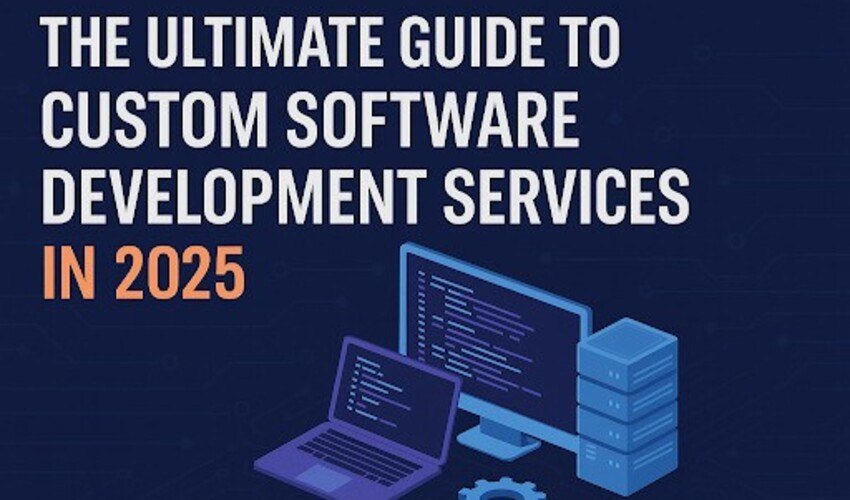
Introduction:
In today’s digital-first economy, businesses are turning to custom software development services to build powerful, scalable tools tailored to their unique needs. Unlike generic, off-the-shelf products, custom solutions align with internal workflows, security demands, and growth strategies.
As 2025 unfolds, the demand for custom-built applications is surging across sectors like healthcare, fintech, IoT, and enterprise SaaS. The reason? Businesses need software that isn’t just functional, but transformative.
This guide explains what custom software development is, its benefits, who it’s for, and why it’s a smart investment in the era of digital acceleration. It also includes real-world examples and strategic insights to help you make informed decisions.
What is Custom Software Development?
Custom software development is the process of building software applications designed specifically for a company’s operations, users, or market niche. Unlike pre-built software, custom solutions are fully tailored to meet a business’s strategic goals, technical requirements, and compliance needs.
These solutions are often built using Agile methodology, allowing for rapid prototyping, iterative development, and continuous delivery. Whether it’s an internal dashboard, a mobile app, or a full-scale enterprise platform, custom software ensures alignment between tech and business processes.
Custom solutions provide the flexibility to adapt features, modules, and performance layers as user expectations evolve. This kind of adaptability is nearly impossible with prepackaged tools. Plus, the integration with your CRM, ERP, or cloud stack can be designed for seamless workflows.
Why Businesses Choose Custom Software
Tailored Functionality
Custom applications solve specific problems. For example, a logistics company may need GPS-powered routing software integrated with fuel-efficiency trackers—something generic tools don’t offer. Similarly, an education company might require an adaptive learning engine tied to student performance data.
Scalability and Adaptability
Custom software grows with your business. Using modular designs and cloud-native architecture, teams can scale features or add users without system slowdowns or technical debt. Startups can launch MVPs with a lean feature set and expand them with data-driven iterations.
This also empowers enterprises to respond quickly to changing market conditions, regulatory updates, or shifts in customer behavior—all without re-platforming.
Enhanced Security and Compliance
Businesses can implement custom encryption, access controls, and compliance protocols (HIPAA, GDPR, PCI-DSS) that match industry-specific requirements. For example, healthcare apps may include biometric logins, while financial apps need secure transaction layers and real-time audit trails.
Security isn’t just a checkbox—it’s engineered into the fabric of custom solutions from the beginning, not retrofitted as an afterthought.
Innovation and Competitive Advantage
Companies investing in machine learning development services are streamlining operations with intelligent automation and real-time analytics. This gives them an edge in personalization, decision-making, and operational efficiency.
With AI, businesses can:
- Predict inventory demands
- Personalize user interfaces
- Automate customer service workflows
- Flag unusual behavior for fraud detection
Innovation becomes proactive instead of reactive.
Long-Term Cost Efficiency
While upfront costs may be higher, businesses save over time by eliminating licensing fees, avoiding unnecessary features, and gaining operational efficiency. There’s no dependency on vendor timelines, feature restrictions, or rising subscription fees.
Additionally, better internal alignment leads to faster onboarding, higher employee productivity, and fewer errors across departments.
Who Needs Custom Software in 2025?
Custom solutions are especially useful for:
- Healthcare providers need EHR systems, HIPAA-compliant portals, and wearable integrations.
- FinTech companies are seeking secure, scalable CRMs and multi-currency payment gateways.
- IoT businesses are building platforms for real-time monitoring and smart device management.
- Startups aim to launch MVPs quickly and iterate based on real-time feedback.
- Educational institutions are digitizing curriculum delivery, attendance, and performance analytics.
- Retail and e-commerce businesses are looking to personalize shopping experiences with AI.
These industries benefit from software that is purpose-built and future-ready. More importantly, it allows organizations to set benchmarks rather than follow them.
How Much Does It Cost?
Custom software development costs vary based on complexity, features, team size, and location. On average:
- MVPs range from $25,000 to $60,000
- Mid-sized apps range from $60,000 to $150,000
- Enterprise platforms can exceed $250,000
Other cost factors include:
- Number of integrations
- Tech stack (e.g., React, Flutter, Node.js, AWS)
- UI/UX design complexity
- Required compliance standards
The pricing model can be:
- Fixed – best for small, well-scoped projects
- Time-and-materials – flexible and ideal for iterative builds
- Dedicated team – great for startups or long-term product development
Questions to Ask Before You Start
- What business problem are we solving?
- How will we measure success (KPIs)?
- What integrations are non-negotiable?
- How will users interact with the product?
- Do we need mobile-first, cloud-first, or hybrid architecture?
Answering these questions early ensures your custom software will not only meet expectations but exceed them.
Final Thoughts
Custom software isn’t just about tech—it’s about strategy. It enables businesses to optimize workflows, enhance customer experiences, and innovate faster than the competition. With scalable architecture, advanced security, and full customization, it’s an investment in resilience and long-term growth.
Whether you’re a CTO at a scale-up or a founder launching a disruptive product, custom software offers the alignment, control, and innovation you need to lead, not follow.
If you’re ready to build software around your vision—not someone else’s—then custom development is the right path forward.
Author Bio:
I’m Muhammad Shoaib Karim, a branding strategist and content contributor at Kodexo Labs. I specialize in crafting compelling, SEO-optimized content around software development, AI, and digital transformation. With a deep interest in product-led storytelling and user-centric design, I love translating complex tech concepts into clear, engaging narratives that deliver value to developers, entrepreneur,s and business leaders. At Kodexo Labs, I help position brands as industry leaders through thoughtful content and growth-focused strategies.
